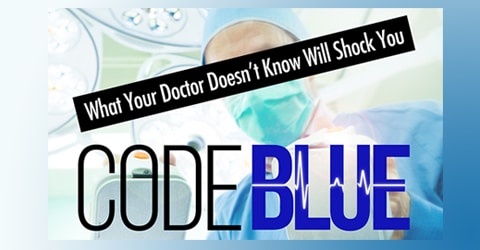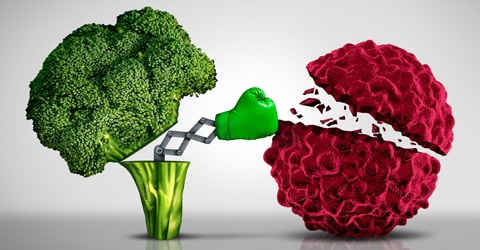

A code blue is a medical emergency. It means a patient is dying and that we must rush to the bedside to revive them. As a physician, I know it well. It is a rush of urgency and desperation that healthcare professionals experience as they act swiftly to save a life. When the time came for naming our documentary, Code Blue was the title that best fit what I hoped to convey to the public. I wanted the name of the film to reflect the emergent matter before us, evoking a gut response to react—not next year or tomorrow, but immediately. Our healthcare system is failing us, and it has been for some time now. Most recent statistics show an increase in seven of the top 10 leading causes of death, including heart disease, stroke, Alzheimer’s disease, diabetes, and suicide.[1] The obesity rate in the United States is now a shocking 42.4%, which is sobering considering no state in the commonwealth reported an obesity rate above 15% just 30 years ago.[2][3] What will it take to finally say enough is enough?
If we know that the most important factor leading to premature death is poor nutrition, then how is it that doctors learn little to nothing about nutrition during their training?
When we embarked on the film project in 2015, the primary initiative was to shed light on the overwhelming body of evidence that supports the importance of diet and lifestyle on the formation of chronic disease. We had no idea its release would be hampered by an acute novel infectious disease. Over the past several months, we have suffered a global period of mourning as our lives have been turned upside down and we have witnessed the loss of so many loved ones. In the midst of this pandemic, Code Blue was released on May 26, 2020, to a community universally in pain. COVID-19 would lead to the cancellation of our theatrical releases in Los Angeles, New York, and Pennsylvania, as well as scratch our plans for a film tour. As an infectious disease specialist who trained in pandemic preparedness, admittedly even I was caught off guard. This virus, for which we still have many unanswered questions, remains elusive and has not only managed to take countless lives but has also irrevocably changed societal norms. The development of a safe and effective vaccine is yet to be realized. Trials for therapeutics are ongoing, some cautiously optimistic, but it will still be some time before they are readily available to the general public. How does the COVID-19 pandemic relate to the chronic disease epidemic and Code Blue? It is, indeed, alarmingly relative. The virus has placed an unexpected and startling spotlight on the chronic disease epidemic. On June 15, the CDC published findings on those affected by COVID-19 in the United States from January to the end of May 2020. Data revealed approximately 1.8 million cases and more than 100,000 deaths during this period. Chillingly, those living with a chronic disease were six times more likely to be hospitalized and twelve times more likely to die. The pandemic has further deeply affected our most vulnerable minority communities, with 33% of cases occurring in Hispanics and 22% in Blacks.[4]
We are a society drowning in chronic disease, and so in turn, we are ill-equipped to battle this novel contagion that is most affecting that very subset of the population. The fact that 50% of Americans are living with at least one chronic disease is in large part due to the failures of our current-day healthcare system, which places little to no emphasis on the value of prevention and health promotion.[5]Instead, our misguided approach is fully vested in treating those who are already stricken by disease with pills and procedures.
If we know that the most important factor leading to premature death is poor nutrition, then how is it that doctors learn little to nothing about nutrition during their training?[6][7] Despite all the scientific evidence, we still miss the golden opportunity to teach the most powerful intervention known to mankind to those who dispense the care. It is a national tragedy. Today we have the knowledge and understanding to prevent nearly 80% of chronic disease, yet we fail to act to disseminate this life-saving message.[8] In my estimation, this borders on immoral. The true purpose of this writing, though, is to share the joy of this newly released film in hopes it will resonate with all who watch it, and to inspire them to share it with others.
The personal appeal of making a documentary is that this would be a medium by which we could bring awareness to an issue of concern to a large audience and potentially catalyze a movement that demands better of our healthcare system, academic institutions, hospitals, and clinics.
It is my hope that Code Blue will awaken something within physicians, healthcare professionals, and communities far and wide to act now. Together we can create a better future for those who follow us. Ironically, the silver lining of the COVID-19 infectious disease pandemic may be that it provided the spark that ignited the end of the chronic disease plague and ushered in an era of wellness and health promotion. In order to achieve this momentous milestone, I know it will take much from many. Code Blue is my humble contribution to this vital effort.
References
- National Vital Statistics Reports, Vol. 68, No. 6, June 24, 2019.
- https://www.cdc.gov/obesity/data/adult.html
- https://www.cdc.gov/obesity/data/prevalence-maps.html
- https://www.cdc.gov/mmwr/volumes/69/wr/mm6924e2.htm
- https://www.cdc.gov/chronicdisease/about/index.htm
- McGinnis et al. Committee on Population; Division of Behavioral and Social Sciences and Education; Board on Health Care Services; National Research Council; Institute of Medicine. Measuring the Risks and Causes of Premature Death: Summary of Workshops. Washington (DC): National Academies Press (US); 2015 Feb 24. 3, Data from Major Studies of Premature Mortality.
- Eisenberg DM & Burgess JD (2015) Nutrition Education in an Era of Global Obesity and Diabetes: Thinking Outside the Box. Acad Med March 2015.
- Ford et al. Healthy Living Is the Best Revenge: Findings from the European Prospective Investigation into Cancer and Nutrition–Potsdam Study. Arch Intern Med. 2009;169(15):1355–1362.
Copyright 2026 Center for Nutrition Studies. All rights reserved.
Deepen Your Knowledge With Our
Plant-Based Nutrition
Certificate
Plant-Based Nutrition Certificate
- 23,000+ students
- 100% online, learn at your own pace
- No prerequisites
- Continuing education credits







